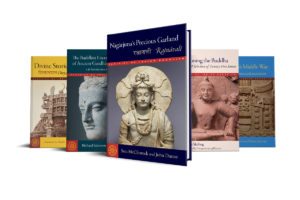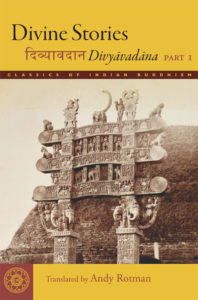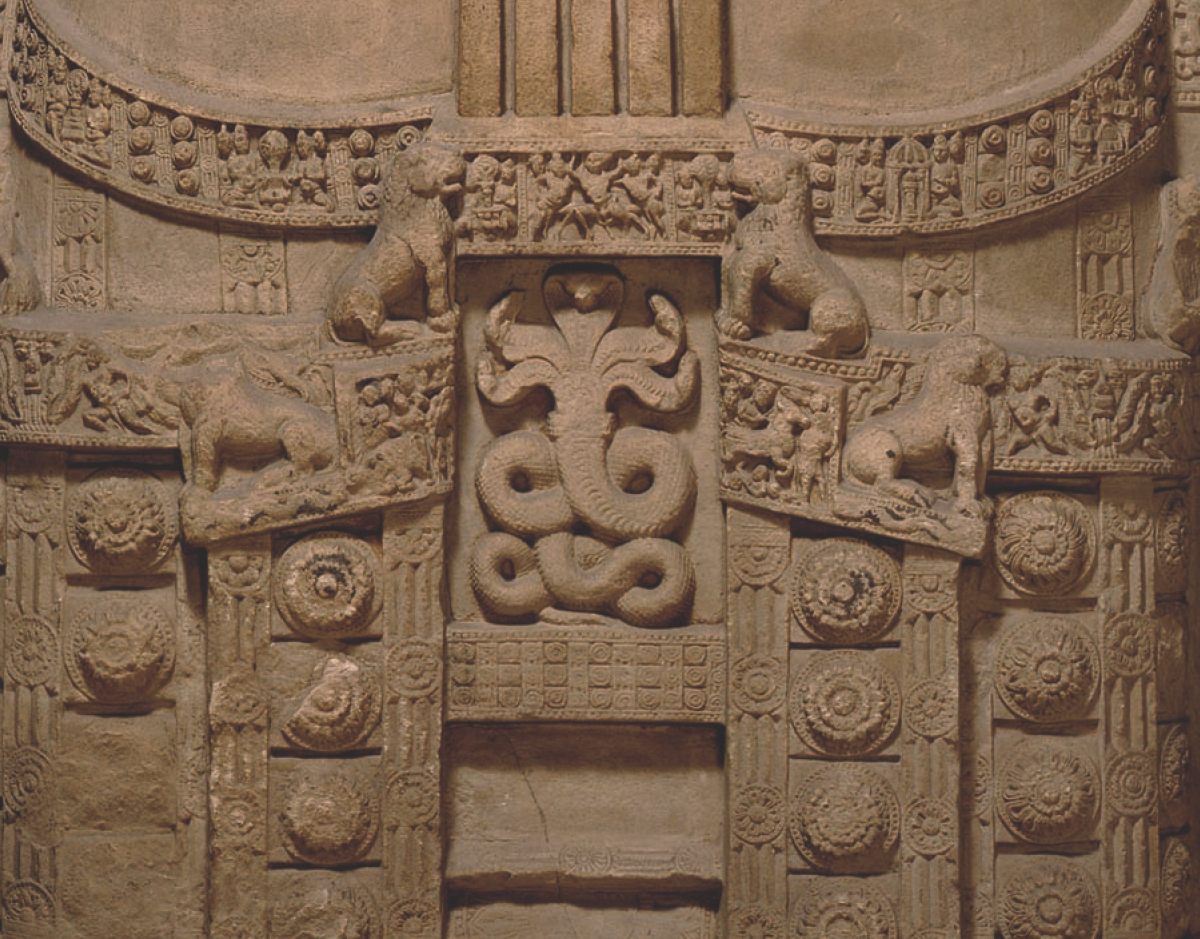
Classics of Indian Buddhism
Translations of Foundational Texts From the Buddhist Traditions of South Asia
Classics of Indian Buddhism
The flourishing of Buddhism in South Asia during the first millennium of the Common Era produced many texts that deserve a place among the classics of world literature. Exploring the full extent of the human condition and the limits of language and reason, these texts have the power to edify and entertain a wide variety of readers. The Classics of Indian Buddhism series aims to publish widely accessible translations of important texts from the Buddhist traditions of South Asia, with special consideration given to works foundational for the Mahāyāna.
Editorial Board
Andy Rotman (chair), Smith College
Paul Harrison, Stanford University
Jens-Uwe Hartmann, University of Munich
Sara McClintock, Emory University
Parimal Patil, Harvard University
Akira Saitō, University of Tokyo
Explore the Series
LATEST RELEASE
Nāgārjuna’s Precious Garland: Ratnāvalī
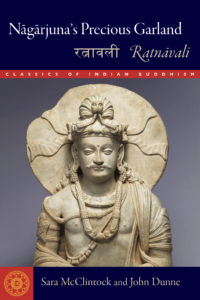 In this profound work of five hundred verses, we encounter a presentation of Buddhism that integrates both the worldly and the transcendent. The clear and sagacious advice laid out on every page serves as a road map to one’s highest goal—whether that goal is a better life, here called the Dharma of ascendance, or the ultimate one of spiritual freedom, the Dharma of the highest good. The verses, written for an unnamed ruler, touch on questions of statecraft, but their broader themes speak to us today because they tackle the difficulty of integrating one’s spiritual journey with the social and political demands of daily life.
In this profound work of five hundred verses, we encounter a presentation of Buddhism that integrates both the worldly and the transcendent. The clear and sagacious advice laid out on every page serves as a road map to one’s highest goal—whether that goal is a better life, here called the Dharma of ascendance, or the ultimate one of spiritual freedom, the Dharma of the highest good. The verses, written for an unnamed ruler, touch on questions of statecraft, but their broader themes speak to us today because they tackle the difficulty of integrating one’s spiritual journey with the social and political demands of daily life.
Nāgārjuna was an Indian Buddhist teacher, probably of the second century CE, who was renowned for his astute articulation of the philosophy of the Middle Way (Madhyamaka). His thoroughgoing critique of all forms of essentialism became a touchstone for Mahāyāna Buddhism in India, Tibet, and throughout East Asia, and his importance for the development of the Mahāyāna tradition can scarcely be exaggerated.
Questioning the Buddha: A Selection of Twenty-Five Sutras
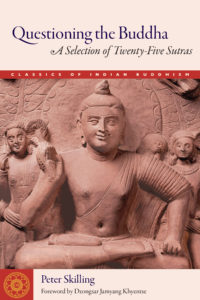 In the forty-five years the Buddha spent traversing northern India, he shared his wisdom with everyone from beggar women to kings. Hundreds of his discourses, or sutras, were preserved by his followers, first orally and later in written form. Around thirteen hundred years after the Buddha’s enlightenment, the sutras were translated into the Tibetan language, where they have been preserved ever since. To date, only a fraction of these have been made available in English. Questioning the Buddha brings the reader directly into the literary treasure of the Tibetan canon with thoroughly annotated translations of twenty-five different sutras. Often these texts, many translated here in full for the first time, begin with an encounter in which someone poses a question to the Buddha.
In the forty-five years the Buddha spent traversing northern India, he shared his wisdom with everyone from beggar women to kings. Hundreds of his discourses, or sutras, were preserved by his followers, first orally and later in written form. Around thirteen hundred years after the Buddha’s enlightenment, the sutras were translated into the Tibetan language, where they have been preserved ever since. To date, only a fraction of these have been made available in English. Questioning the Buddha brings the reader directly into the literary treasure of the Tibetan canon with thoroughly annotated translations of twenty-five different sutras. Often these texts, many translated here in full for the first time, begin with an encounter in which someone poses a question to the Buddha.
Peter Skilling, an authority on early Buddhist epigraphy, archaeology, and textual traditions, has been immersed in the Buddhist scriptures of diverse traditions for nearly half a century. In this volume, he draws on his deep and extensive research to render these ancient teachings in a fresh and precise language. His introduction is a fascinating history of the Buddhist sutras, including the transition from oral to written form, the rise of Mahayana literature, the transmission to Tibet, the development of canons, and a look at some of the pioneers of sutra study in the West.
Divine Stories: Divyāvadāna Part 1
Divine Stories is the inaugural volume in the Classics of Indian Buddhism series. The stories here, among the first texts to be inscribed by Buddhists, highlight the moral economy of karma, illustrating how gestures of faith, especially offerings, can bring the reward of future happiness and ultimate liberation. Originally contained in the Divyāvadāna, an enormous compendium of Sanskrit Buddhist narratives from the early Common Era, the stories in this collection express the moral and ethical impulses of Indian Buddhist thought and are a testament to the historical and social power of narrative. Long believed by followers to be the actual words of the Buddha himself, these divine stories are without a doubt some of the most influential stories in the history of Buddhism.![]()
Nāgārjuna’s Middle Way (Mūlamadhyamakakārikā)
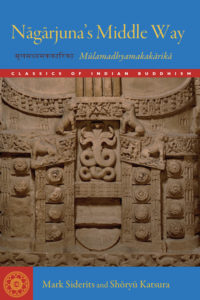 Winner of the 2014 Khyentse Foundation Translation Prize
Winner of the 2014 Khyentse Foundation Translation Prize
Nāgārjuna’s renowned twenty-seven-chapter Fundamental Verses on the Middle Way (Mūlamadhyamakakārikā) is the foundational text of the Madhyamaka school of Mahayana Buddhist philosophy. It is the definitive, touchstone presentation of the doctrine of emptiness. Professors Siderits and Katsura prepared this translation using the four surviving Indian commentaries in an attempt to reconstruct an interpretation of its enigmatic verses that adheres as closely as possible to that of its earliest proponents. Each verse is accompanied by concise, lively exposition by the authors conveying the explanations of the Indian commentators. The result is a translation that balances the demands for fidelity and accessibility.
Divine Stories: Divyāvadāna Part 2
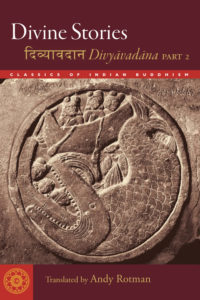 Winner of the 2018 Khyentse Foundation Translation Prize
Winner of the 2018 Khyentse Foundation Translation Prize
Ancient Buddhist literature is filled with tales of past lives. The Buddha, surrounded by his followers, is asked how it came to be that a certain person has met a particular fate. With his omniscience, the Buddha looks into eons past and uncovers the events that led to the present outcome and foretells the future as well. With stories of wicked wives, patricidal princes, and shape-shifting serpents, Divine Stories offers a fascinating illustration of the law of karma—the truth that the power of good and bad deeds is never lost. These are some of the oldest Buddhist tales ever committed to writing, illuminating the culture of northern India in the early centuries of the Common Era and bringing to life the Buddhist values of generosity and faith.
The Buddhist Literature of Ancient Gandhāra: An Introduction with Selected Translations
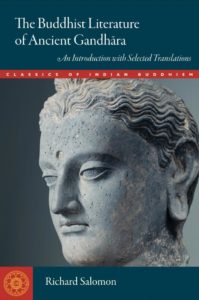 Winner of the 2020 Khyentse Foundation Prize for Outstanding Translation and the Prix Collett Caillat en Études Indiennes
Winner of the 2020 Khyentse Foundation Prize for Outstanding Translation and the Prix Collett Caillat en Études Indiennes
In the years following Alexander the Great’s conquest of the East, a series of empires rose up along the Silk Road. In what is now northern Pakistan, the civilizations in the region called Gandhāra became increasingly important centers for the development of Buddhism, reaching their apex under King Kaniska of the Kusanas in the second century CE. Gandhāra has long been known for its Greek-Indian synthesis in architecture and statuary, but until about twenty years ago, almost nothing was known about its literature. The insights provided by manuscripts unearthed over the last few decades show that Gandhāra was indeed a vital link in the early development of Buddhism, instrumental in both the transmission of Buddhism to China and the rise of the Mahāyāna tradition. The Buddhist Literature of Ancient Gandhāra surveys what we know about Gandhāra and its Buddhism, and it also provides translations of a dozen different short texts, from similes and stories to treatises on time and reality.
Meet the Series Authors
Andy Rotman is chair of the editorial board of the Classics of Indian Buddhism series. He is the Sydenham Clark Parsons Professor of Religion, Buddhism, and South Asian Studies at Smith Col-lege. His publications include Hungry Ghosts (Wisdom Publications, 2021), Thus Have I Seen: Visualizing Faith in Early Indian Buddhism (Oxford University Press, 2009), and a coauthored volume, Amar Akbar Anthony: Bollywood, Brotherhood, and the Nation (Harvard University Press, 2015). He is also the translator of the inaugural volume in the Classics of Indian Buddhism series, Divine Stories: Divyāvadāna Part 1, as well as Divine Stories: Divyāvadāna Part 2.
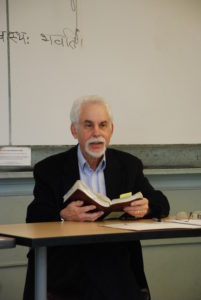 Richard G. Salomon of the University of Washington is a leading figure in the field of early Buddhist studies. He directs the Early Buddhist Manuscripts Project and is general editor of the Gandharan Buddhist Texts series published by the University of Washington Press. He is the author and translator of the Classics of Indian Buddhism volume The Buddhist Literature of Ancient Gandhara. He lives in Seattle, Washington.
Richard G. Salomon of the University of Washington is a leading figure in the field of early Buddhist studies. He directs the Early Buddhist Manuscripts Project and is general editor of the Gandharan Buddhist Texts series published by the University of Washington Press. He is the author and translator of the Classics of Indian Buddhism volume The Buddhist Literature of Ancient Gandhara. He lives in Seattle, Washington.
 Mark Siderits retired from Seoul National University in 2012, having taught previously at Illinois State University; he now lectures occasionally at Kyoto University. His research interests lie in the intersection between classical Indian philosophy on the one hand, and analytic metaphysics and philosophy of language on the other. Among his more recent publications are Personal Identity and Buddhist Philosophy: Empty Persons, 2nd edition (Ashgate, 2015) and How Things Are: An Introduction to Buddhist Metaphysics (Oxford University Press, 2021). A collection of his papers on Buddhist philosophy, Studies in Buddhist Philosophy, was published by Oxford in 2016. He is the co-author of the Classics of Indian Buddhism volume Nāgārjuna’s Middle Way.
Mark Siderits retired from Seoul National University in 2012, having taught previously at Illinois State University; he now lectures occasionally at Kyoto University. His research interests lie in the intersection between classical Indian philosophy on the one hand, and analytic metaphysics and philosophy of language on the other. Among his more recent publications are Personal Identity and Buddhist Philosophy: Empty Persons, 2nd edition (Ashgate, 2015) and How Things Are: An Introduction to Buddhist Metaphysics (Oxford University Press, 2021). A collection of his papers on Buddhist philosophy, Studies in Buddhist Philosophy, was published by Oxford in 2016. He is the co-author of the Classics of Indian Buddhism volume Nāgārjuna’s Middle Way.
 Professor Shōryū Katsura received his training in Sanskrit and Buddhist Studies at Kyoto University and the University of Toronto. From 1974 to 2004 he taught in the Department of Indian Philosophy at Hiroshima University; from 2004 he was Professor of Buddhist Philosophy at Ryukoku University, Kyoto, until his retirement in 2012. He remains active at Ryukoku University, where he is Director of their Research Center for Buddhist Cultures in Asia. He is the author or editor of seven books, and has published over sixty articles on various facets of classical Indian Buddhist thought. He is perhaps best known for his work on Buddhist epistemology—the thought of Dignaga, Dharmakirti, and their commentators—but has also made important contributions to the study of Madhyamaka, Abhidharma, and later Mahayana thought. He is the co-author and co-translator of the Classics of Indian Buddhism volume Nāgārjuna’s Middle Way. In addition, he serves as chief priest of Kodaiji, a small Jodo-shinshu temple in Shiga Prefecture.
Professor Shōryū Katsura received his training in Sanskrit and Buddhist Studies at Kyoto University and the University of Toronto. From 1974 to 2004 he taught in the Department of Indian Philosophy at Hiroshima University; from 2004 he was Professor of Buddhist Philosophy at Ryukoku University, Kyoto, until his retirement in 2012. He remains active at Ryukoku University, where he is Director of their Research Center for Buddhist Cultures in Asia. He is the author or editor of seven books, and has published over sixty articles on various facets of classical Indian Buddhist thought. He is perhaps best known for his work on Buddhist epistemology—the thought of Dignaga, Dharmakirti, and their commentators—but has also made important contributions to the study of Madhyamaka, Abhidharma, and later Mahayana thought. He is the co-author and co-translator of the Classics of Indian Buddhism volume Nāgārjuna’s Middle Way. In addition, he serves as chief priest of Kodaiji, a small Jodo-shinshu temple in Shiga Prefecture.
 Peter Skilling is a special lecturer at Chulalongkorn University, Bangkok, and an honorary associate, Department of Indian SubContinental Studies, University of Sydney, Australia. Until his retirement in 2017, he was a professor of the French School of Asian Studies (EFEO) based in Bangkok. He was awarded an honorary doctorate in the humanities by Chulalongkorn University in 2020. He is an honorary member of the Siam Society, Bangkok, and in 2017 he was elected an honorary fellow of the Asiatic Society of Mumbai. He has been visiting professor at Harvard University (2000), the University of California at Berkeley (2001), Oxford University (2002), Sydney University (2009), Soka University (2009), and Savitribai Phule Pune University (2016–17). He has published widely on the Buddhist literature, history, and epigraphy of South and Southeast Asia. He is the author of the Classics of Indian Buddhism volume Questioning the Buddha.
Peter Skilling is a special lecturer at Chulalongkorn University, Bangkok, and an honorary associate, Department of Indian SubContinental Studies, University of Sydney, Australia. Until his retirement in 2017, he was a professor of the French School of Asian Studies (EFEO) based in Bangkok. He was awarded an honorary doctorate in the humanities by Chulalongkorn University in 2020. He is an honorary member of the Siam Society, Bangkok, and in 2017 he was elected an honorary fellow of the Asiatic Society of Mumbai. He has been visiting professor at Harvard University (2000), the University of California at Berkeley (2001), Oxford University (2002), Sydney University (2009), Soka University (2009), and Savitribai Phule Pune University (2016–17). He has published widely on the Buddhist literature, history, and epigraphy of South and Southeast Asia. He is the author of the Classics of Indian Buddhism volume Questioning the Buddha.


